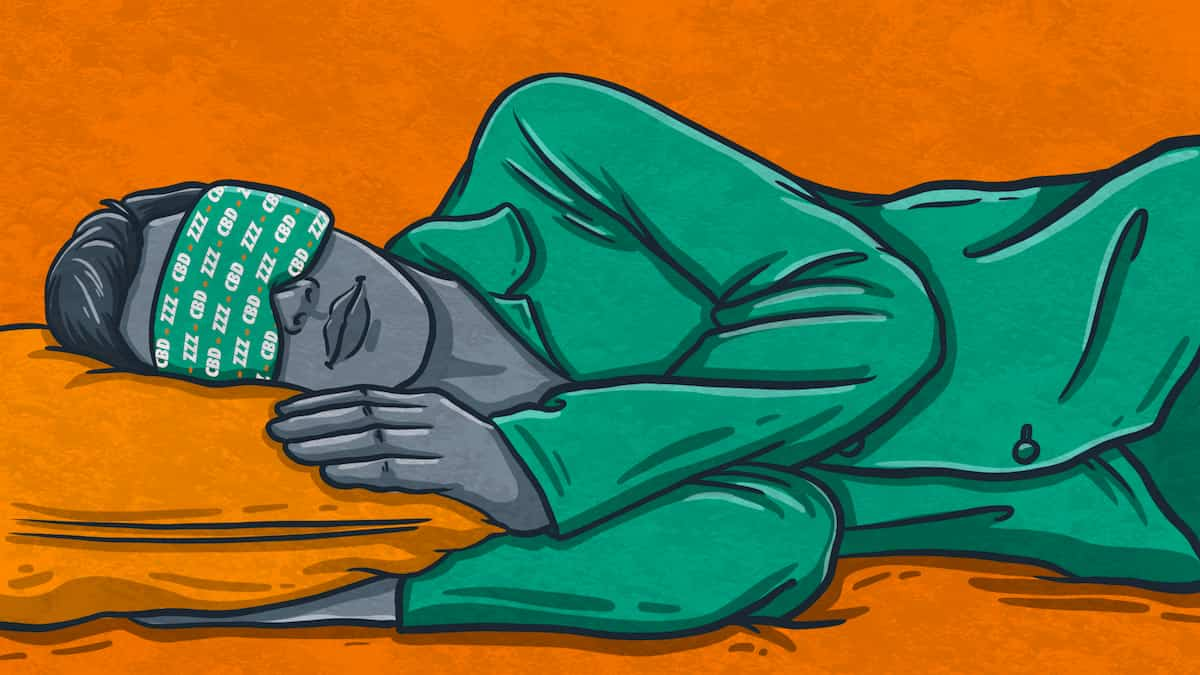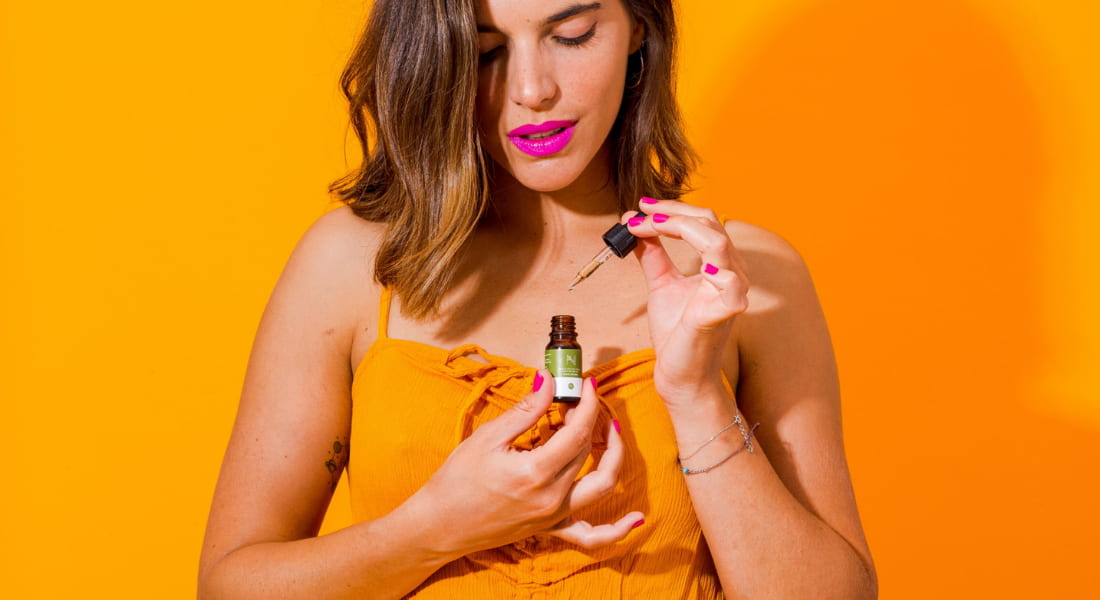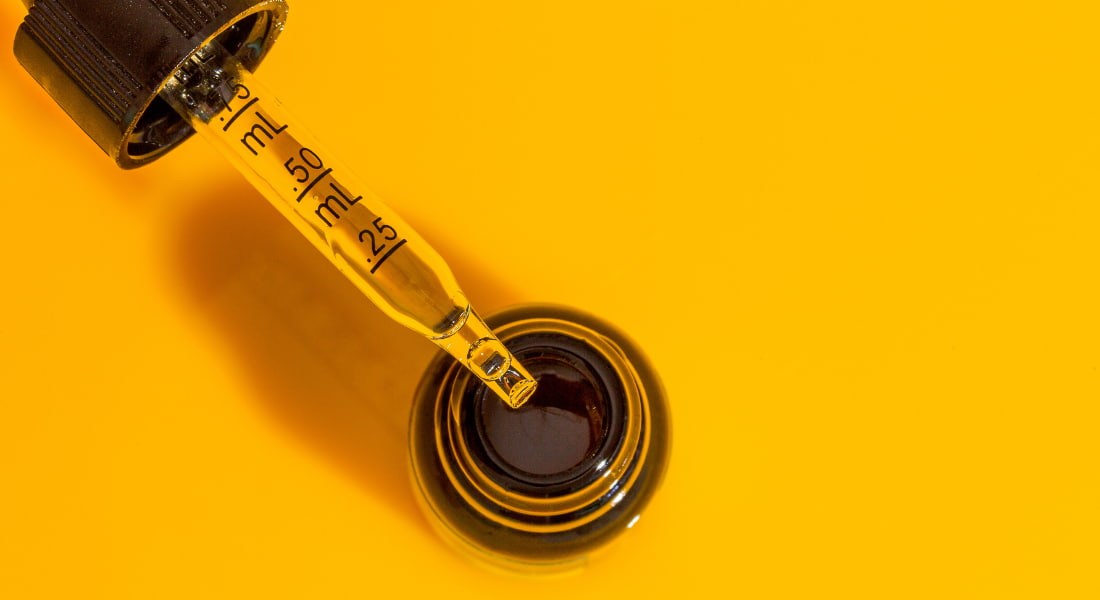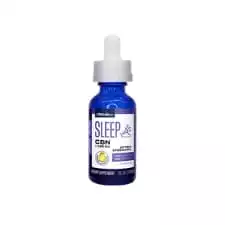CBD Oil For Sleep: Does It Help, & How?
If you’ve ever laid awake in the dead of night, desperately trying to fall asleep while your brain goes 100mph and you feel as awake and alert as ever, you’ll be aware that people are often willing to do anything for a good night’s rest.
The result is a parade of sleep-based wellness trends, from melatonin and meditation to a quiet reading time before bed and, of course, the biggest by far at the moment – CBD oil.
The use of CBD oil for sleep has fast become a new phenomenon. But, is it actually useful, and if so, how should you take it for the best results?
We dig into the science behind CBD and sleep below, so stay tuned!

Does CBD Oil Help You Sleep?
While there isn’t heaps of research that exclusively examines the connection between CBD oil and sleep outside of pre-clinical data, the mechanics of how CBD may potentially impact your ability to improve sleep quality is still relatively unclear.
Cannabinoids such as CBD and THC act upon receptors within the endocannabinoid system (ECS), which regulates sleep patterns amongst other physiological functions. The ECS works like an internal body clock, chiming in according to our pre-set patterns, helping us maintain a day and night rhythm.
A growing volume of anecdotal evidence highlights that the use of CBD oils has the potential for improved patterns of rest. However, challenges still exist around finding the right dose, consumption route, makeup of the compounds found in hemp, along with balancing potential side effects and timing.
Additionally, anecdotal evidence is subject to potential placebo effects and a lack of quality control, which we know is a huge problem even with CBD products as a whole.
It’s also possible that other influencing factors could play a part in poor sleep, for example, anxiety. And while losing sleep due to increased anxiety might be considered an indirect factor. However, there’s already a growing body of evidence that the use of CBD Oil for anxiety could be beneficial and, in turn, may help you fall asleep faster and with better restfulness.
As a result, the use of CBD for sleep isn’t as clear-cut as you might have hoped. Nonetheless, there is an ever-increasing bank of studies looking at if CBD might be helpful for those who struggle to fall asleep unaided.
Now that you know that cannabinoid receptors help the body fine-tune and use CBD, next is figuring out how to use CBD products.

Method Of CBD Consumption
It’s important to note that research suggests CBD may be more effective when it is a broad or full spectrum (the CBD extract also contains THC and other cannabinoids) plant profile.
Meaning it contains other beneficial ingredients beyond CBD, which are also found in hemp and thought to contribute to the synergistic potential (entourage theory) of whole-plant cannabis. And yes, this includes THC!
When it comes to vaping, most CBD e-liquids only contain CBD isolate, which is pure CBD with none of the other potentially beneficial ingredients often found in CBD oil and concentrates, such as terpenes and other cannabinoids.
As a result, standard CBD vape liquids that only contain CBD isolate are often considered useful for enjoyment or help reduce the desire to smoke or vape cannabis but are thought to not be as effective for feeling the fuller well-being effects of cannabidiol (CBD).
CBD Oil Benefits for Sleep: What Does the Research Say?
Early indications from studies outline that cannabinoids such as CBD can potentially support balanced sleep behavior, especially when a lack of sleep is related to anxiety or stress, as suggested above.
For example, one study into whether or not CBD can help to improve sleep and/or anxiety in a clinical population of 72 adults found decreased anxiety in 57 of the patients (79.2%) and improved rest in 48 (66.7%).
Those with decreased anxiety reached it within the first month and were sustained through the duration of the study. The percentage of those more rested did fluctuate some during the study.
The study was limited by small sample size, short duration, being open-label, and no control group; therefore, larger and more rigorous studies are needed. However, it provides a suggestion that the impact CBD can have on sleep could also potentially be attributed to reduced anxiety.
900mg CBD & 300mg CBN for the perfect addition to your evening routine. Highly rated and third party tested.
While the study noted that further investigation was necessary, especially into the most effective doses, the research pointed towards a benefit for anxiety-related issues and insomnia, concluding that CBD was better tolerated than routine prescription medications for anxiety.
A 2012 study on rodents further supports this suggestion, indicating that “CBD may block anxiety-induced REM sleep alteration via its anxiolytic effect, rather than via sleep regulation per se”, which in plain English means that CBD improved deep sleep by its anti-anxiety effect rather than by regulating the function directly.
While another study on rodents in 2013 concluded that CBD increased the time rats spent asleep during the day and night.
As you can probably see, the data are mostly preclinical and aren’t conclusive, nor does it suggest that CBD products work wonders for sleep directly. Nonetheless, the data to date do generally suggest that CBD has “therapeutic potential for the treatment of insomnia.” If this is due to how it works with other health conditions that impact, sleep is still something under investigation.

Will CBD Make Me Drowsy?
Likely due to the stereotypes around cannabis smokers, many people wonder whether trying CBD to help with shuteye will make them tired as an unwanted set of side effects or if using it is dangerous when driving or operating heavy machinery.
After all, is there any point in taking a supplement to help you fall asleep if you’re going to wake up groggy and sluggish the next day regardless?
You might be concerned that because most CBD oils also contain traces of THC, that this could increase the likelihood of drowsiness outside of evenings.
Well, you have nothing to fear in most cases unless a large amount is consumed or if you know how it affects your body. According to the FDA, a recent report states that CBD can cause sleepiness, sedation, and that may make operating a motor vehicle or machinery dangerous after consuming CBD products.
Since CBD works via interacting with the endocannabinoid system to promote a feeling of relaxation instead of being a strong sedative or opiate, it’s unlikely to elicit daytime sleepiness (or morning grogginess) as long as you find your dosage sweet spot for CBD.
Note – if you’re using CBD at night, then naturally, it’s likely you’re already going to be feeling tired anyway, and while CBD may play a part in improving your sleep routine, it isn’t going to knock you out to sleep immediately and effects may fluctuate over time as tolerance and other lifestyle factors change.
How to Take CBD for Sleep
Using CBD oil isn’t the only way to consume cannabidiol.
Absorption and onset rates differ significantly depending on the administration route due to differences in bioavailability. For example, edibles like CBD gel caps take at least 45 and potentially up to 90 minutes to absorb.
On the other hand, if you vape a CBD concentrate, it can deliver a potent dose within a matter of minutes by using a dab pen.
Related Read: CBD Concentrates Review
Nonetheless, the full spectrum of CBD products you can use for sleep include:
- CBD gummies
- CBD capsules
- CBD oil tinctures
- CBD vape cartridges
- And many more
However, some thought needs to be made to understand the exact mg of CBD you might need to take.
Your exact CBD dosage will vary depending on both your consumption method and the reason you’re using CBD. It’s also essential to note that this established dose can change across time and potentially even within the same day, depending on why you’re taking CBD at that moment.
That’s because there isn’t a single dose of CBD which addresses the multiple potential benefits of CBD and reasons why people use it outside of just sleep.

CBD Can Take Time To Work
Some consumption methods have quicker access to the bloodstream than others, with vaping thought to be one of the most ‘efficient’ and fastest ways to use CBD; certainly more rapid than a sublingual CBD oil.
But, if, like many, you’re not a fan of vaping or prefer not to for health reasons, sublingual CBD oils taken 30-45 minutes before bed will also ensure you feel the effects in the right time frame to impact sleep.
Otherwise, you can always chew on CBD gummies for a sweeter sleep aid instead of a dropper of oil.
CBD Absorption Rates Differ
If you are vaping CBD for sleep or in the hope of achieving some positive effects for your wellbeing, try a broad or full spectrum product. It’s also critical to remember that different methods of use have varying levels of bioavailability.
This means that one approach doesn’t directly translate to another in respect to absorption, and switching from one method of taking CBD to another doesn’t necessarily mean that your ideal dose remains the same too. Cannabinoid tolerance is another factor that can develop over time.
The second most straightforward method of using CBD in terms of absorption rate is to take CBD oil drops under the tongue. For many people with no history of smoking or vaping, this is the preferable method to experience the effects.
Of course, taking pure CBD oil via a dropper opens up other potential routes too, such as cooking with CBD oil or adding it to drinks and smoothies, making it perhaps the most versatile method.
This does rely on you having a high-quality broad or full-spectrum CBD oil, though. Otherwise, you may be missing out on some potential effects in a similar manner to vaping CBD isolate.
To learn more about how to take CBD oil, including more methods and tips on how to calculate your ideal dose, take a look at our guide on how to take CBD.
CBD Oil Dosage for Sleep
CBD oil, in general, is said to be mildly stimulating in small amounts, and medium to high doses are considered to be sedating.
It also appears the time it is used can have an adjustment on the overall effect. Consequently, CBD oil is regarded as a stimulant by some and a relaxant by others depending on the dosage, adding to the confusion.
Studies specifically tackling dosing are few and far between.
Nonetheless, we have come across a couple of studies, and they all suggest a higher mg of CBD per dose than average can help improve both quality and length of sleep.
For example, a 2004 study of 8 young adults suggested medium doses (5mg or 15mg, 1:1) of CBD and THC in combination correlated with improved wakefulness. If the enhanced rest is attributed to CBD, THC, or both combined is another question for discussion. In this study, the THC was sedating but caused some impairment the next day.
On the flipside, in another instance, individuals with insomnia were given very high doses of 160 mg CBD per participant, resulting in reduced sleep disturbances and an increase in the number of hours slept.
While another research study from 2012 seems to support the ideal CBD oil dosage for insomnia varies significantly. Preclinical studies suggest that 150-600mg/day may help with insomnia, social anxiety disorder, and epilepsy.
So, as you can see, the data isn’t exactly consistent in outlining a range of CBD dosage for sleep.
All of this suggests that the best CBD oil dosage for sleep varies dramatically from person to person and their exact situation.
This is because there are simply too many variables involved for one recommended dose to be suitable for everyone. These variables include but are not limited to:
- The person’s weight, metabolism, and age
- The person’s endocannabinoid system and tolerance for/previous experience with cannabidiol
- The quality of the CBD product you’re using
- The other ingredients present in the CBD oil (e.g THC and terpenes)
- Other supplements or medications that are being used
- The milligrams of cannabidiol in the bottle of CBD oil.
With this many potential variables, it’s simply impossible to find an ideal dose that will suit everybody in one go.
However, based on the early research results above, you can assume that it’s a good idea to go with a dose slightly on the low end (5-15mg), then slowly increase it until you find the best results. This will also help minimize the potential side effects of CBD.
This form of CBD dosage titration will help you figure out what works for you to improve your sleep cycle.
So start low, go slow, and work your way up to the best mg of CBD for you!
What’s The Best CBD Oil For Sleep?
Good question. The best CBD oil to use in any case meets the following:
- Broad or full spectrum CBD
- Fully third party tested (full panel)
- Extracted under cGMP or GMP standards
Where cGMP standards for current good manufacturing practices. This is a benchmark borrowed from the broader supplement and pharmaceutical industry which governs the inputs and outputs of supplements.
As a result, any brand with cGMP certification will have a tight control on their supply chain, including third-party testing, and often offer some of the best CBD on the market.
These criteria are why we would recommend checking out CBDistillery or Extract Labs, both CBD brands that far exceed the criteria set out above.
900mg CBD & 300mg CBN for the perfect addition to your evening routine. Highly rated and third party tested.
CBD Sleep Tips
We would highly recommend you maintain an appropriate bedtime routine, including spending some time winding down before bed.
For at least one hour before bed, you should avoid any stressful tasks or physical exertion. In an ideal world, avoiding caffeine and bright screens such as a smartphone is useful; instead, just read a book!
Maintaining a consistent sleeping pattern will make things easier as your body will be aware of when it should begin to start winding down. The US CDC has a helpful list of recommendations for proper sleep hygiene.
Maintaining a healthy diet is also useful, as is regular exercise and ensuring you have a comfortable bed.
At the end of the day, all of the existing evidence so far seems to suggest that the answer to the question of “Can CBD oil help you sleep better?” is up to you to decide.
Nonetheless, this doesn’t suggest it’s a miracle worker, and going directly from running around managing your busy life to attempting to rest immediately will always be difficult.
The Bottom Line: Best CBD For Sleep
It’s clear that the experience of using CBD oil varies by individual significantly and that they’re issues in determining the exact mg of CBD right for sleep along with the exact chemical composition of the product being used.
Nonetheless, the reports for its anecdotal and preclinical use to improve sleep is growing, and it’s something to keep an eye on as time progresses.
If you suffer from any type of health concerns, side effects, sleep disorders, or are on prescription medication, ensure you talk to your physician before continuing to use or using CBD oil.
Otherwise, if you’re interested, then give full-spectrum cannabidiol a go and monitor your daily progress.


